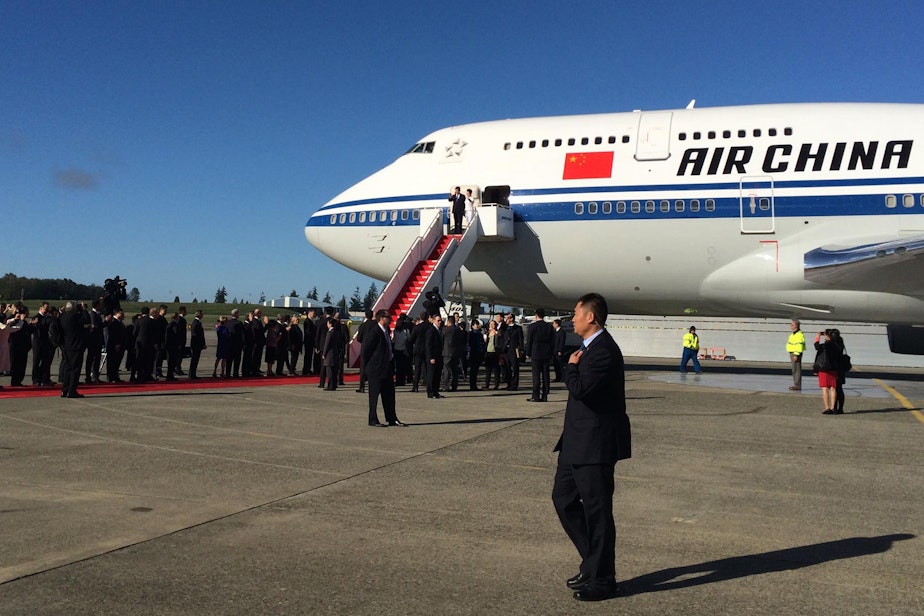Doing Business In China Means Risky Game For U.S. Companies

The tech and business leaders meeting with President Xi Jinping in Seattle this week know a lot about doing business in China — the risks as well as the opportunities.
China, says Boeing, will soon be the largest commercial plane market in the world. Already a quarter of the planes Boeing builds go there, including the 747 that carried Xi here.
And Boeing on Wednesday announced a deal to sell 300 airplanes to China -- a deal valued at $38 billion at list prices. Most of the planes that China is buying for airlines and leasing companies will be 737s.
Boeing also confirmed it will build a 737 completion center in China – to paint the planes and finish their interiors. The company says the completion center will not cost jobs on the production line in Seattle.
But the union representing Machinists says workers here should have all the 737 production work.
Parts made in China are inside Boeing planes worldwide. So it makes sense that a room full of business people would pay $100 for lunch and the chance to listen to Boeing talk about opportunities in China.
"We expect it to overtake the American market in terms of size by 2030," said Randy Tinseth is vice president of marketing for Boeing Commercial Airplanes.
The reason for the optimism: China's growing middle class.
“You think about it from a population perspective, China is about four times the size of the United States,” Tinseth said. “Its middle class is bigger than the population of the United States.”
Those people want consumer goods, and they want to fly. And Boeing doesn’t have a Chinese competitor for passenger airplanes – yet.
But American tech companies know what happens when China decides they're unwelcome.
"They are used to competing on a level playing field, and China makes that hard," said Todd Bishop, an editor with Geekwire, a Seattle tech news blog.
"And it’s just a challenge for these firms to essentially operate in a way that is not in a free market."
Internet companies face an additional obstacle because they’re structured around a free Internet, and China demands controls.
“Some of them can’t even operate there,” Bishop said. “Facebook, Google, they’re filtered out. With Microsoft, China essentially put a ban on Windows 8 sales to the government and they’re out developing their own operating system.”
Then there’s the issue of cyber-spying. Is China spying on us? Are we spying on China?
Those are the macro issues, but here’s a micro issue that can affect businesses of all sizes doing business in China: The rules in China change all the time.
Almond Roca – you know the candy – was doing well in China. John Melin, chief operating officer at the Tacoma-based company, says China made a new rule to stop public servants from giving each other gifts – even candy.
“Anti-excessive consumption,” he called it.
A fifth of the candy business disappeared.
"It affected us that year and it slowed our growth the following year,” Melin said.
But the attitude here is that the opportunities are worth the danger. And the danger is shared.
“In my nine trips to China and talking with Chinese leaders, they’ll tell you all about the risks that they are taking opening up to U.S. investment," said U.S. Rep. Rick Larsen, who represents Boeing territory, north of Seattle.
“If we just looked at the hurdles that exist between the two countries and threw up our hands and not work together, well then neither country is doing the rest of the world a favor.”
